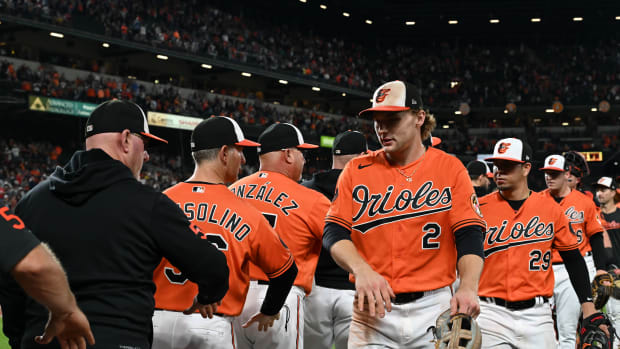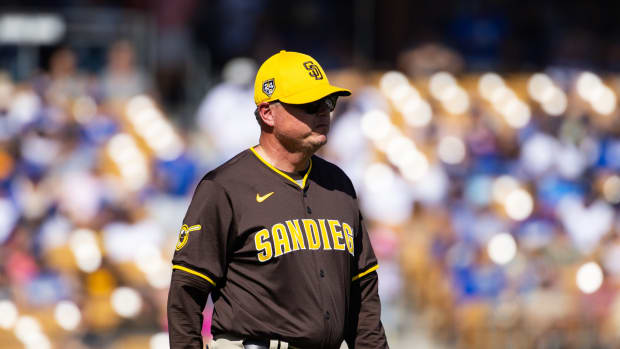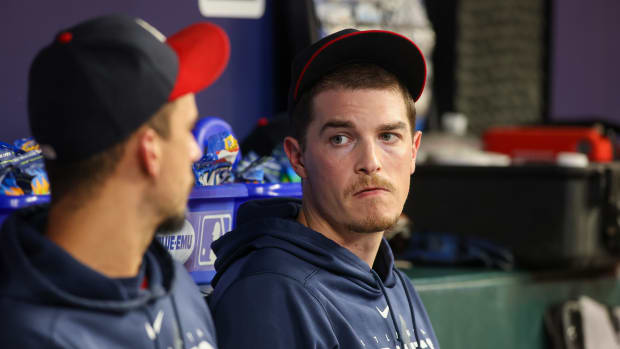Peak ambition: Why the Colorado Rockies will be baseball's surprise team in 2017
In this season of predictions, chalk rules. Most of the picks look like a reprise of the 2016 standings, with division winners the Nationals, Cubs, Dodgers, Red Sox, Indians and, to a lesser extent, Rangers drawing heavy support. Of the nine teams most favored by Las Vegas to win the World Series, all of them were in the playoffs last year except the Houston Astros, which missed the tournament by five wins.
Here’s a secret for you: baseball seasons are almost never that predictable.
These are the two most important trends to keep in mind when it comes to forecasting the postseason:
1. For 11 consecutive seasons, at least three division winners did not repeat.
2. For 11 consecutive seasons—and 21 of the 22 years the wild card format has been in use—one or more teams made the postseason the year after posting a losing record.
I’ve become a believer in the Turnaround Team theory. Over the past three seasons I’ve searched for the teams most likely to pull off the common loser-to-postseason trick. Each year one of the teams I ranked first or second did indeed make the playoffs, including the AL East-winning Red Sox last year—and five of the nine teams ranked in the top three.
Overreacting to Opening Day: The Cubs won't repeat and the Yankees won't contend
Two helpful clues to finding such teams are a new manager (38% of Turnaround Teams had a new leader) and improvement in run prevention (run production was less important).
To keep the Turnaround Team streak going, we have 14 choices. Which of those 2016 losers will be in the playoffs this year?
The answer is the Colorado Rockies, your sleeper pick for 2017. The Rockies have a new manager in Bud Black and a pitching staff filled with young arms that is on track to improve this year. And if you buy into the ultimate small sample—Opening Day—you couldn’t help but notice the importance of how Colorado came from behind to beat Milwaukee, 7-5: Black used five relief pitchers for exactly one inning. None of them allowed a run. Relief work will determine the Rockies’ year.
Picking Colorado to go to the postseason is fraught with danger because winning in Denver is more difficult than anywhere else. Competing at altitude wears down players, especially pitchers, and Rockies players have to recalibrate the break on pitches every time they switch from home to road and vice versa.
Last year on Aug. 3, for instance, Colorado was 54-53 and three games out of the NL's second wild card spot. Yet the Rockies were the worst team in the league thereafter, going 21-34 with a 5.24 ERA, half a run worse than before.
“Yes, I do feel like we’re ready to take that next step,” Colorado GM Jeff Bridich said during spring training. “We accomplished the goal of playing meaningful games in August and September. It didn’t work out for us in terms of the postseason last year. But we accomplished that, and it’s time to go from a talented group to a good team that challenges for the playoffs and truly is a playoff team. And so yeah, there were some areas of this team with that in mind that we feel we needed to address and we feel like we addressed those.”
Here’s what I like about the Rockies: They are flush with players in the prime of their careers and they are probably the most athletic team in baseball—the same traits shared by the 2015 Royals. When outfielder David Dahl and first baseman Ian Desmond return to the lineup from injuries, every Colorado starter will be between 24 and 31 years old. The Rockies likely will lead the major leagues in runs.
Can Colorado stop people from scoring though? That's always the key to a season for the Rockies. Their starting pitchers are good enough, especially if Chad Bettis makes it back midseason from a recurrence of testicular cancer. Jon Gray could be a breakout star, Tyler Anderson is a difficult puzzle to solve with his Kershaw-like hitch and disappearing fastball, Tyler Chatwood was a wizard on the road last year (8-1, 1.69) and Jeff Hoffman, German Marquez and Antonio Senzatela are ascending.
Ask Bridich about the most important element for Colorado—whether it posts a seventh straight losing season or makes good on my Turnaround Team prediction—and the answer is obvious.
“I would say our relief pitching,” he said, “and I think that’s because that’s the area of the most upside and growth in this major league team. We have talented pitchers. Some of them are young. Some of them are coming back from Tommy John and different phases of that, but the talent is there.
“And I think a lot of rotation last year showed that that as a group they really battled and competed and grew as a group well together. They really pushed each other. That concept of iron sharpens iron? That really defined our rotation last year to a big extent. There’s the opportunity for that in the bullpen this year.”
Puig done with Dodgers, Mariners are October-bound, more bold predictions for 2017
Here is where the Rockies' bullpen has ranked the past five years, starting in 2012: 28th, 28th, 29th, 30th, 30th. If Black can manage a bullpen that is mediocre, this team can make the playoffs. That would mean getting mileage out of well-worn veterans Mike Dunn, Greg Holland, Jake McGee, Adam Ottovino and Chad Qualls—a risky proposition over six months in Denver. Some of Colorado’s young power arms are going to have to contribute.
Speaking about Dunn, who was signed as a free agent, and Holland, McGee and Ottovino, all of whom are coming back from various injuries, Black said, “Those are four veteran guys we feel really good about.”
The bullpen has tremendous volatility, especially because it will be asked to work so much. Bridich has a team that can compete in the rugged National League West. This year he likely will have to step out of his comfort zone and add to this team midseason to avoid a repeat from last year. But make no mistake: the Rockies are loaded with players at the right age and with athleticism, and with the experienced Black replacing the inexperienced Walt Weiss, they have the right ingredients to be this year’s sleeper team.
If not Colorado, here are the 2016 losing teams with the next best chances to be in the postseason this year:
2. Arizona Diamondbacks: Four years ago, Taijuan Walker, Shelby Miller and Archie Bradley were among the most coveted young power arms in baseball. A year ago Zack Greinke became the highest salaried player in history. Robbie Ray is coming off a breakout season.
You get the idea: Arizona has a high-ceiling pitching staff, and I love what GM Mike Hazen has done to get the most out of it: emphasized catching defense (Jeff Mathis and Chris Iannetta over bat-first Welington Castillo); hired Dan Haren, who pitched in the majors for 13 years, as a game-planning strategist; and hired analytics whiz Mike Fitzgerald. With A.J. Pollack back in centerfield, the Diamondbacks just may post the biggest improvement on the run prevention side. The Diamondbacks are probably a year away from the playoffs, but with their own new manager, Torey Lovullo, they are developing a strong culture that may accelerate the timetable.
3. Pittsburgh Pirates: They are transitioning, so it may be asking too much for pitchers Jameson Taillon, 25, and Tyler Glasnow, 23, to pile up innings deep into September.
4. Tampa Bay Rays: We know their starting pitchers are solid and their outfield defense—led by Gold Glove centerfielder Kevin Kiermaier—is amazing. Like Colorado, Tampa Bay will rise or fall on its bullpen, which ranked 21st in ERA last year and lost more games than any other 'pen. The offense is too one-dimensional for my tastes, stocked with flyball hitters with too much swing-and-miss in their game (MLB-worst contact rate last year).
5. Los Angeles Angels: The pitching is just too fragile to expect a postseason spot, but the offense, which last year ranked 17th even with AL MVP winner Mike Trout, should be much improved.



































